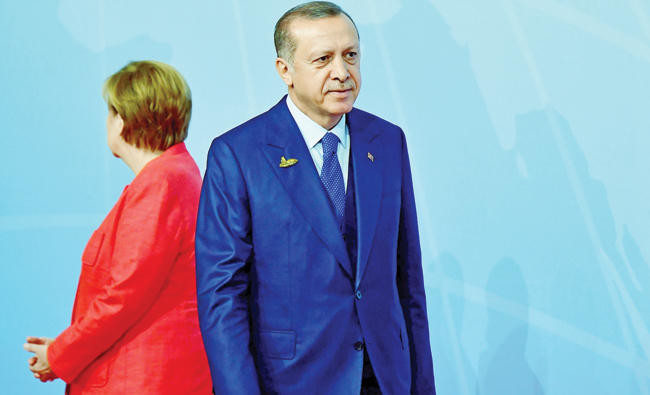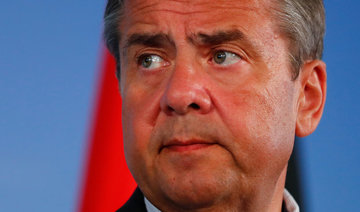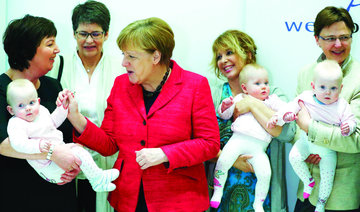ANKARA: Ahead of Germany’s general election on Sept. 24, the war of words between Ankara and Berlin is escalating.
On Friday, Turkish President Recep Tayyip Erdogan described Germany’s ruling Christian Democrats and Social Democrats, as well as the Green Party, as “enemies of Turkey.”
Erdogan urged Germany’s 1 million ethnic Turks who will vote to reject these parties. “This is a struggle of honor for all my citizens living in Germany. They should be taught a lesson,” he said.
The call was criticized by Germany’s ruling politicians. Foreign Minister Sigmar Gabriel said the “unprecedented” call undermined German sovereignty.
Erdogan hit back on Aug. 19, when he said Gabriel must “know his limits.” Erdogan said: “He is trying to teach us a lesson. What is your background in politics? How old are you?”
Chancellor Angela Merkel, who criticized Turkey days ago for jailing dissident journalists and activists, reacted via a Twitter statement by her chief spokesman Steffen Seibert: “On President Erdogan’s recent statements: We expect foreign governments not to intervene in our internal affairs.”
Merkel committed to prevent the launch of customs union modernization negotiations with Turkey.
Germany recently withdrew its troops from a military base in southern Turkey and relocated them to Jordan, after Ankara refused to permit German lawmakers to visit the forces there.
The major trade partners and NATO members have been at odds since Berlin refused to allow Turkish politicians to campaign in Germany for Turkey’s constitutional referendum in April.
In reaction, Turkey’s ruling AK Party (AKP) accused Germany of employing “Nazi practices.”
There are 10 Germans, either journalists or activists, in detention in Turkey — another point of contention.
Talip Kucukcan, head of the Parliamentary Assembly of the Council of Europe and an AKP lawmaker, said Turkish-German relations have a long and deep-rooted history.
“I believe that rationality and realism will shape the future of relations between Turkey and Germany,” he told Arab News.
“The volume of economic relations, the presence of a large Turkish diaspora, and strategic partnership over migration and security will come to the fore and drive Turkish-German relations.”
The worst scenario, Kucukcan said, is pressure by Berlin on German companies operating in Turkey to limit their investments.
“But this might backfire due to global competition for Turkish markets, so I believe that the leaders of Turkey and Germany won’t allow a lose-lose policy,” he said, adding that the business world and the Turkish diaspora may play a constructive mediation role.
Kucukcan said Ankara will never accept Germany as a partner as long as it is a safe haven for members of terrorist organizations such as the Kurdistan Workers’ Party (PKK) and the Gulen movement, which is believed to have been behind last year’s failed coup attempt in Turkey.
Ozgur Unluhisarcikli, Ankara office director at the German Marshall Fund of the US, said both countries have grievances and think the other side will back down, but both may be wrong.
“Germany is apparently inspired by Russia’s success in changing Turkey’s policy in Syria through economic pressure, and thinks that economic pressure is the only language the Turkish government understands,” Unluhisarcikli told Arab News.
Germany is Turkey’s largest economic and trade partner, and has significant investments in Turkey with about 7,000 German companies.
The crisis has reduced the number of German tourists in Turkey, traditionally among the largest groups of visitors.
Ankara sees Berlin’s stance “as a tactic against the populist right during the upcoming parliamentary election, and wishfully thinks Merkel will soften her position after the election,” Unluhisarcikli said.
But while both Turkey and Germany stand to lose from the crisis, they can afford to maintain their positions for much longer than either anticipates, he added.
“Turkey changed its policy toward Syria not only because of Russian economic pressure, but also because the policy was no longer in sync with the reality on the ground, so it’s not true that Ankara will back down every time it faces economic pressure,” said Unluhisarcikli.
“Merkel’s position reflects a growing dislike of the Turkish government among Germans and throughout Europe, which isn’t expected to change after the elections in Germany.”
Unluhisarcikli said all grievances on both sides can be addressed, and what is needed is increased diplomacy and fewer public statements by German and Turkish politicians.
German-Turkish war of words escalates
German-Turkish war of words escalates

Groups fear Israeli proposal for controlling aid in Gaza will forcibly displace people
“Israel has the responsibility to facilitate our work, not weaponize it,” said Jens Laerke, a spokesperson for the UN agency
TEL AVIV: Israel has blocked aid from entering Gaza for two months and says it won’t allow food, fuel, water or medicine into the besieged territory until it puts in place a system giving it control over the distribution.
But officials from the UN and aid groups say proposals Israel has floated to use its military to distribute vital supplies are untenable. These officials say they would allow military and political objectives to impede humanitarian goals, put restrictions on who is eligible to give and receive aid, and could force large numbers of Palestinians to move — which would violate international law.
Israel has not detailed any of its proposals publicly or put them down in writing. But aid groups have been documenting their conversations with Israeli officials, and The Associated Press obtained more than 40 pages of notes summarizing Israel’s proposals and aid groups’ concerns about them.
Aid groups say Israel shouldn’t have any direct role in distributing aid once it arrives in Gaza, and most are saying they will refuse to be part of any such system.
“Israel has the responsibility to facilitate our work, not weaponize it,” said Jens Laerke, a spokesperson for the UN agency that oversees the coordination of aid Gaza.
“The humanitarian community is ready to deliver, and either our work is enabled ... or Israel will have the responsibility to find another way to meet the needs of 2.1 million people and bear the moral and legal consequences if they fail to do so,” he said.
None of the ideas Israel has proposed are set in stone, aid workers say, but the conversations have come to a standstill as groups push back.
The Israeli military agency in charge of coordinating aid to Gaza, known as COGAT, did not respond to a request for comment and referred AP to the prime minister’s office. The prime minister’s office did not respond either.
Since the beginning of March, Israel has cut off Gaza from all imports, leading to what is believed to be the most severe shortage of food, medicine and other supplies in nearly 19 months of war with Hamas. Israel says the goal of its blockade is to pressure Hamas to free the remaining 59 hostages taken during its October 2023 attack on Israel that launched the war.
Israel says it must take control of aid distribution, arguing without providing evidence that Hamas and other militants siphon off supplies. Aid workers deny there is a significant diversion of aid to militants, saying the UN strictly monitors distribution.
Alarm among aid groups
One of Israel’s core proposals is a more centralized system — made up of five food distribution hubs — that would give it greater oversight, aid groups say.
Israel has proposed having all aid sent through a single crossing in southern Gaza and using the military or private security contractors to deliver it to these hubs, according to the documents shared with AP and aid workers familiar with the discussions. The distribution hubs would all be south of the Netzarim Corridor that isolates northern Gaza from the rest of the territory, the documents say.
One of the aid groups’ greatest fears is that requiring Palestinians to retrieve aid from a small number of sites — instead of making it available closer to where they live — would force families to move to get assistance. International humanitarian law forbids the forcible transfer of people.
Aid officials also worry that Palestinians could end up permanently displaced, living in “de facto internment conditions,” according to a document signed by 20 aid groups operating in Gaza.
The hubs also raise safety fears. With so few of them, huge crowds of desperate Palestinians will need to gather in locations that are presumably close to Israeli troops.
“I am very scared about that,” said Claire Nicolet, emergency coordinator for Doctors Without Borders.
There have been several occasions during the war when Israeli forces opened fire after feeling threatened as hungry Palestinians crowded around aid trucks. Israel has said that during those incidents, in which dozens died, many were trampled to death.
Given Gaza’s population of more than 2 million people, global standards for humanitarian aid would typically suggest setting up about 100 distribution sites — or 20 times as many as Israel is currently proposing — aid groups said.
Aside from the impractical nature of Israel’s proposals for distributing food, aid groups say Israel has yet to address how its new system would account for other needs, including health care and the repair of basic infrastructure, including water delivery.
“Humanitarian aid is more complex than food rations in a box that you pick up once a month,” said Gavin Kelleher, who worked in Gaza for the Norwegian Refugee Council. Aid boxes can weigh more than 100 pounds, and transportation within Gaza is limited, in part because of shortages of fuel.
Experts say Israel is concerned that if Hamas seizes aid, it will then make the population dependent on the armed group in order to access critical food supplies. It could use income from selling the aid to recruit more fighters, said Kobi Michael, a senior researcher at two Israeli think tanks, the Institute for National Security Studies and the Misgav Institute.
Private military contractors
As aid groups push back against the idea of Israel playing a direct distribution role within Gaza, Israel has responded by exploring the possibility of outsourcing certain roles to private security contractors.
The aid groups say they are opposed to any armed or uniformed personnel that could potentially intimidate Palestinians or put them at risk.
In the notes seen by AP, aid groups said a US-based security firm, Safe Reach Solutions, had reached out seeking partners to test an aid distribution system around the Netzarim military corridor, just south of Gaza City, the territory’s largest.
Aid groups urged each other not to participate in the pilot program, saying it could set a damaging precedent that could be repeated in other countries facing crises.
Safe Reach Solutions did not respond to requests for a comment.
Whether Israel distributes the aid or employs private contractors to it, aid groups say that would infringe on humanitarian principles, including impartiality and independence.
A spokesperson for the EU Commission said private companies aren’t considered eligible humanitarian aid partners for its grants. The EU opposes any changes that would lead to Israel seizing full control of aid in Gaza, the spokesperson said.
The US State Department declined to comment on ongoing negotiations.
Proposals to restrict who can deliver and receive aid
Another concern is an Israeli proposal that would allow authorities to determine if Palestinians were eligible for assistance based on “opaque procedures,” according to aid groups’ notes.
Aid groups, meanwhile, have been told by Israel that they will need to re-register with the government and provide personal information about their staffers. They say Israel has told them that, going forward, it could bar organizations for various reasons, including criticism of Israel, or any activities it says promote the “delegitimization” of Israel.
Arwa Damon, founder of the International Network for Aid, Relief and Assistance, says Israel has increasingly barred aid workers from Gaza who had previously been allowed in. In February, Damon was denied access to Gaza, despite having entered four times previously since the war began. Israel gave no reason for barring her, she said.
Aid groups are trying to stay united on a range of issues, including not allowing Israel to vet staff or people receiving aid. But they say they’re being backed into a corner.
“For us to work directly with the military in the delivery of aid is terrifying,” said Bushra Khalidi, Oxfam’s policy lead for Israel and the occupied Palestinian territory. “That should worry every single Palestinian in Gaza, but also every humanitarian worker.”
Yemeni Prime Minister Ahmed bin Mubarak resigns

- Mubarak said he had faced “lots of difficulties”, including being unable to reshuffle the government
Ahmed Awad bin Mubarak, the prime minister of Yemen's internationally recognized government, said on Saturday he had submitted his resignation.
In a statement, Mubarak said he had faced “lots of difficulties”, including being unable to reshuffle the government.
MSF says its hospital bombed in South Sudan

- “The pharmacy was destroyed. All medical supplies lost,” MSF said
JUBA: Doctors Without Borders (MSF) said one of its hospitals in South Sudan had been bombed early on Saturday, leading to the loss of all its medical supplies.
“At 4 am today, MSF’s hospital in Old Fangak, South Sudan, was bombed. The pharmacy was destroyed. All medical supplies lost. There are reports of people killed and injured,” the medical charity said in a statement.
UN chief condemns Israeli strikes on Syria

- Antonio Guterres ‘alarmed’ over reports of sectarian violence around Damascus, Suwayda
- UN commission ‘deeply troubled’ after more than 100 people were killed in clashes this week
NEW YORK CITY: UN Secretary-General Antonio Guterres on Friday condemned repeated Israeli airstrikes on Syria as well as growing sectarian violence around Damascus and Suwayda.
The condemnation came after more than 100 people were killed in clashes in the Syrian Arab Republic over the past week.
The violence has taken place in two predominantly Druze suburbs of the capital, Jaramana and Ashrafiyat Sahnaya, as well as in the southern Druze stronghold of Suwayda.
Guterres “has been monitoring with alarm the reports of violence in the suburbs of Damascus and in the south of Syria, including reports of civilian casualties and assassination of local administration figures,” UN spokesperson Stephane Dujarric said on Friday.
The secretary-general condemned “all violence against civilians” and acts that “could risk inflaming sectarian tensions.”
Amid the sectarian clashes, Israel launched a series of airstrikes on Syrian targets, in what it described as an attempt to protect the country’s Druze minority.
Early on Friday, it bombed an area near the Presidential Palace in Damascus. Later that day, it targeted the Damascus, Hama and Daraa countryside, killing one civilian in the former and injuring four people in Hama, Syrian state news agency SANA reported.
Israel acknowledged the strikes, which it claimed targeted “a military site, anti-aircraft cannons and surface-to-air missile infrastructure.”
It followed a warning by Tel Aviv earlier this week that it would attack sites controlled by Syria’s new government if further sectarian clashes involving the Druze minority did not stop.
Guterres condemned Israel’s violation of Syria’s sovereignty and said it was “essential” that the attacks stop. He called on all parties to “cease all hostilities, exercise utmost restraint and avoid further escalation.”
Syria’s interim authorities under the government of President Ahmad Al-Sharaa must “transparently and openly” investigate all violations of peace in a bid to uphold their commitment to “dialogue and cooperation within the framework of national unity,” Guterres added.
On Friday, experts appointed by the UN Human Rights Council on the Commission of Inquiry on Syria described the surge in sectarian violence as “deeply troubling.”
The commission was established in 2011, and its three commissioners serve in an independent capacity.
“The spread of discriminatory incitement and hate speech, including through social media, is fueling violence and risks threating Syria’s fragile social cohesion,” the commission said on Friday. “While the situation remains fluid and an agreement has reportedly been reached between prominent leaders in Suwayda and the authorities in Damascus, the commission underscores that the interim government remains responsible for ensuring the protection of all civilians in areas under its control. Impunity for grave violations has in the past been a consistent driver of Syria’s conflict and must not be allowed to persist.”
The commission also highlighted the risk posed by Israeli airstrikes, as well as Tel Aviv’s continued expansion of its occupation in the Golan Heights.
Israel’s attempts to “divide various Syrian communities risks further destabilizing Syria,” it said.
“Syria’s recent history should serve as a reminder that external interventions have often led to increased violence, displacement and fragmentation.”
Sudan paramilitary drone strike hits border city near Eritrea: govt source

KHARTOUM: Sudanese paramilitaries have carried out a rare drone strike on the eastern city of Kassala, near the Eritrean border, a source from the rival army-aligned government said Saturday.
“A drone targeted the fuel storage area at Kassala airport,” the government source told AFP, blaming it on the paramilitary Rapid Support Forces and reporting no casualties or damage.




















